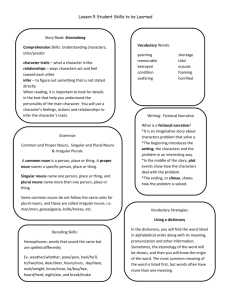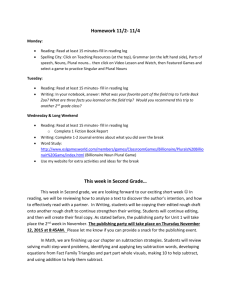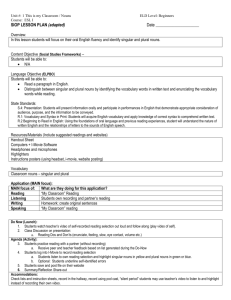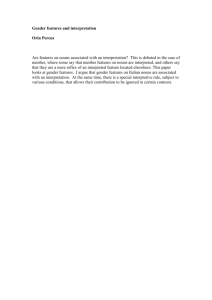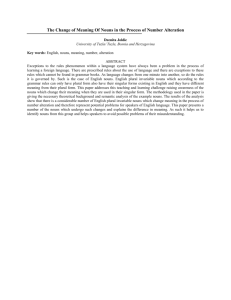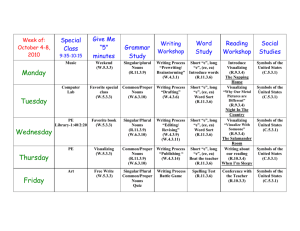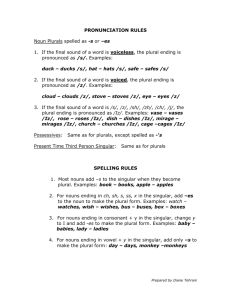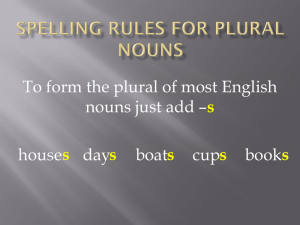The Number of Nouns
advertisement
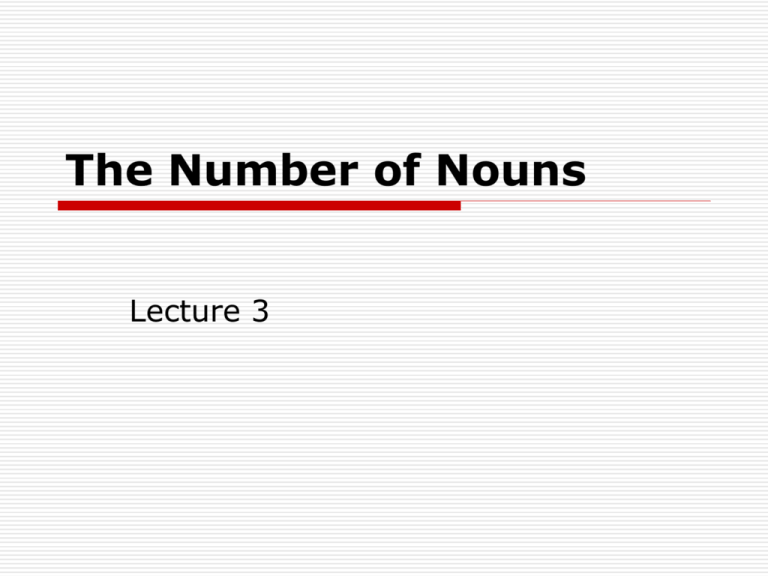
The Number of Nouns Lecture 3 The category of number is based on the functional opposition of two forms of the noun: singular ↔ plural. The singular form is used to refer to a single referent: I have a brother. The plural form is used to refer to a group referent of two or more members: She has three sisters. The semantic opposition of one ↔ more than one is characteristic of countable nouns only. Grammatical Markers of Plurality Countable nouns form their plural by means of grammatical endings or change of the root vowel. a. The regular –s ending can be attached to most English nouns: girl – girls; toy – toys; family – families; idea – ideas; lion – lions In forming the plural we follow certain spelling rules: Final –y after a consonant changes into –i before the grammatical ending: party – parties Final –y does not change in family names: the Kennedys Abbreviated nouns in –o attach the grammatical ending –s: photos, kilos Abbreviations attach –s: Several VIPs are arriving for the ceremony. b. The grammatical ending –es is attached to nouns ending in [s], [z], [dz], [t], [∫]: kisses, vases, bridges, watches, dishes It is also attached to nouns ending in –o: potatoes, heroes c. Some nouns, ending in –th, -f, or –s undergo voicing of the final consonant in the plural. With –th and –s voicing affects pronunciation. The voicing of [f] affects not only pronunciation, but spelling as well: ‘The Merry Wives of Windsor’ d. The grammatical ending –en is attached to several nouns: ox – oxen; child – children e. Change of the root vowel takes place in several nouns: man – men; foot – feet; mouse – mice f. The plural form of some nouns coincides with the singular form (zero plurals): series – series; aircraft – aircraft salmon, sheep, grouse Many borrowed words retain their foreign plural endings: phenomenon – phenomena hypothesis – hypotheses antenna – antennae genius – genii poncho – ponchos tempo – tempi However, many nouns of foreign origin may attach –s ending as well: antenna – antennas (TV or radio aerial) ↔ antenna – antennae (long thin parts on the insect’s head) Singular Plural Singular Plural alumnus alumni curriculum curricula analysis analyses datum data bacterium bacteria genius geniuses/genii (spirits) beau beaux hypothesis hypotheses oasis oases parenthesis parentheses crisis crises phenomenon phenomena Invariable Nouns Uncountable and proper nouns are invariable (they have only one form). Each lexeme belonging to these subclasses is either singular or plural. According to their semantics invariable nouns fall into two groups: singular invariables and plural invariables. Singular invariable nouns take singular verbs. To this group belong the following semantic varieties: - concrete uncountable nouns – milk, copper; - abstract uncountable nouns – anger, safety; - proper nouns – Mount Everest, Shakespeare; - some nouns derived by means of the suffix –s – news, linguistics, Wales; - substantivised words referring to abstract notions – the picturesque, the good, the evil; Plural invariable nouns take plural verbs. This group is comprised of the following varieties: - objects made of two similar parts: - proper collective nouns – people, police, cattle; - some nouns derived by means of the suffix –s – goods, thanks, looks; - proper nouns in –s – Niagara Falls; - substantivised words referring to people – the blind, the disabled; Nouns of Differentiated Plural The plural form of some countable nouns has developed additional meanings altogether different from the meanings of the singular form: arm = an upper limb of the human body arms = weapon, heraldic bearings -s can mark the plural and at the same time acquire a word formative function customs colours Some uncountable nouns have developed meanings different from the basic ones. Such meanings are marked by the plural form: moral = the principle contained in a fable morals = rules of conduct regard = careful thought or attention regards = greetings that show respect Some nouns have different forms of plural which bear different meanings: Singular Plural brother brothers (by birth), brethren (of a society) die dies (for coining or stamping), dice (for play) fish fishes (separate fish), fish (collective) index indexes (in books), indices (in algebra) penny pennies (separate coins), pence (sum of money) staff staves (poles), staffs (bodies of assistants) Subject – Verb Concord of Number Three types of concord of number between subject and verb can be distinguished: a. grammatical concord Singular nouns functioning as subject take singular verbs: The book is on the shelf. Plural nouns take plural verbs: The books are on the shelf. b. notional concord the verb agrees with its subject according to the semantics of the noun rather than its form: The committee are discussing a tight budget. c. concord on the principle of proximity the verb agrees in number with the noun, that is immediately before or after the verb: Neither the teacher nor the students have answered his question yet. Neither the students not the teacher has answered his question yet. There is a piano and two chairs in the room. There are two chairs and a piano in the room.


